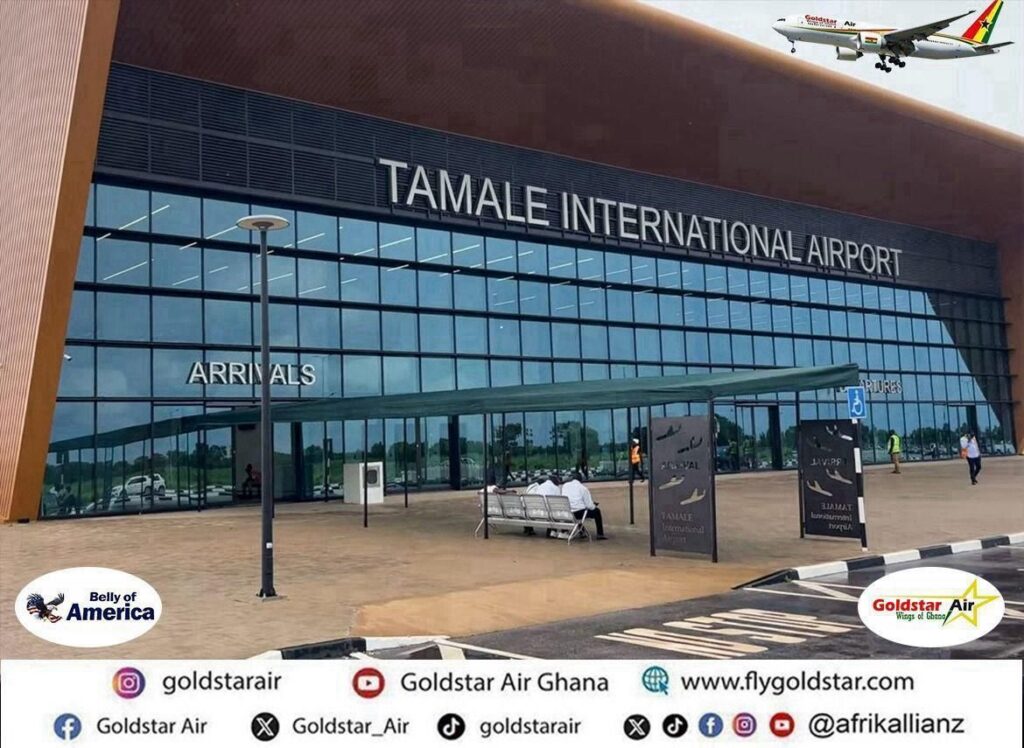Private international airline Goldstar Air, Ghanaian and United States registered company with an issued Air Carrier Licence (ACL/N-SCH No. 0239) from the Ghana Civil Aviation Authority (GCAA) and no liabilities as of today, has secured incentives from major airports worldwide. The airline, as an economic tool, is authorized by its Licence to operate passenger and cargo flights across West Africa and intercontinental routes, reinforcing Ghana’s global aviation presence, with a grand vision to establish a 24-hour Universal Aircraft Maintenance Hub at Tamale International Airport (TML), to tap into the global aviation income stream of $3.5 Trillion.
The airline’s vision for Maintenance, Repair, and Overhaul (MRO) extends far beyond servicing aircraft; it is a holistic development strategy designed to empower Ghana’s aviation sector, unlock economic opportunities for its citizens, and establish a globally respected center of excellence in aircraft maintenance. The project will be named after the National Chief Imam of Ghana, Sheikh Dr. Osman Nuhu Sharubutu, who is expected to lead the sod-cutting ceremony and commission the project upon completion. This will mark a historic milestone, carrying with it the promise of technological advancement, employment generation, skills transfer, regional development, and achieving the airline’s “Project $1 Trillion” foreign reserves.
Goldstar Air has sought for international intervention to look into the issuance of the airline’s wide-body aircraft Safety Certificate (AOC) and waiting for the outcome, as the process is above halfway and it has been over eight years that the Ghana Civil Aviation Authority is not willing to authorize a qualified third party to complete the remaining phases of the certification process. Completion of this certification will enable the change of the wide-body aircraft nationality, allowing it to be registered under the Ghana Registry (State of Registry) and for Goldstar Air to commence operations. Typically, aircraft are registered in the jurisdiction where the carrier is resident or based and may enjoy preferential rights or privileges as a flag carrier for international operations.
Tamale, long recognized as the commercial and administrative heartbeat of Northern Ghana, is strategically positioned for the airline’s maintenance hub to serve not only the country but also the wider African region, where the demand for world-class aviation maintenance facilities is rapidly growing. This development will embody a broader national ambition of transforming the country into a hub of economic activity, job creation, and innovation. Therefore, there is no need to delay the issuance of Goldstar Air’s Safety Certificate, which will help kickstart the 24-hour economy in Tamale and create over two million direct and indirect job opportunities for Ghanaians. The Ghanaian youth cannot wait any longer in the ghettos; they need their well-paying jobs now.
The World Bank says Ghana’s rapidly growing youth population has the potential to significantly boost the country’s economy, but only if sufficient job opportunities are created. The Bank recommends that a key focus should be on youth and their transition from school to work, ensuring they acquire the skills needed for a modern economy to provide strong employment opportunities, essential for realizing the demographic dividend.
Goldstar Air, the wings of Ghana and belly of America, through its Universal Aircraft Maintenance Hub in Tamale, will represent more than just a facility; it will be a statement of Ghana’s readiness to compete on the global stage and tap into the projected African Gross Domestic Product (GDP) of $16.3 Trillion by the year 2050. The aviation industry has always depended heavily on Maintenance, Repair, and Overhaul (MRO) services, which ensure the safety, reliability, and operational efficiency of aircraft fleets. For decades, African airlines and aviation operators have had to outsource MRO services to facilities in Europe, the Middle East, or Asia, often incurring significant costs in terms of logistics, foreign exchange outflow, and downtime. Therefore, the establishment of the airline’s maintenance hub in Tamale will directly address these challenges.
Situating such a 24-hour universal hub in Tamale by Goldstar Air, directly addresses the challenges in aircraft maintenance and repositions Ghana as a leader in providing solutions for Africa’s aviation needs. The hub is envisioned to handle multiple classes of aircraft, ranging from fixed-wing and rotary-wing aircraft to narrow-body regional planes and wide-body international jets. This will enable not only Goldstar Air’s fleet to be serviced locally but also attract regional and global airlines to Ghana for their maintenance requirements. This paradigm shift will help retain capital within the country, reduce operational inefficiencies for airlines across Africa, and build Ghana’s reputation as a trusted MRO center.
The heart of this initiative lies the understanding that aviation is not just about aircraft transporting passengers or cargo; it is an ecosystem that thrives on highly specialized technical support services. The maintenance hub will require a highly skilled workforce, opening vast opportunities for Ghanaian youth in fields such as aerospace engineering, avionics, materials science, hydraulics, safety systems, and advanced diagnostic technologies. The airline’s 24-hour maintenance hub will also serve as a catalyst for the establishment of technical training institutes, aviation schools, and apprenticeship programs in Tamale and other parts of Ghana, ensuring that local talent is developed to meet the stringent standards of global aviation safety and compliance.
Goldstar Air’s 24-hour service through its maintenance facility in Tamale will not only create immediate job opportunities but will also ensure long-term skills development, that will enable Ghanaian engineers and technicians to compete with their counterparts globally. This vision aligns with the broader national agenda of empowering the youth, reducing unemployment, and creating a sustainable knowledge-driven economy. Over time, the Northern Region will no longer be viewed solely as an agrarian area but also as a rising industrial and technological hub, with the aviation industry at its forefront. The aviation industry stands as one of the most dynamic and influential sectors shaping global trade, tourism, and connectivity.

According to the Chairman and Chief Executive Officer of Goldstar Air, Eric Bannerman, the airline will acquire certification from the United States Federal Aviation Administration (FAA), the European Union Aviation Safety Agency (EASA), the Ghana Civil Aviation Authority (GCAA), the International Air Transport Association (IATA), the IATA Operational Safety Audit (IOSA), and Authorized Training Center status. Goldstar Air relationship with Boeing Company has committed the airline to prioritize the Boeing series, especially the Boeing 787 Dreamliners and the 777X variants, which are ideal for the airline’s intercontinental routes from the center of the world. Goldstar Air looks forward to placing aircraft orders and acquiring General Electric (GE) equipment soon. This will lead to greater productivity, job creation, and increased revenue for Boeing while contributing to the overall economic growth of the United States. Goldstar Air is committed to the aerospace business and not just purchasing airplanes or establishing an airline but also ensuring proper long-term maintenance of its fleet for the safety and security of passengers.
Goldstar Air’s training school will upskill personnel to remain sharp, fine-tune their expertise, and maintain unwavering calmness and composure in all situations, from routine to exceptional. This training will be more than a requirement; it will be an achievement reserved for the sky’s most elite. It will meet all aviation-related courses, whether initial, recurrent, advanced, or special operations. The airline will operate with an emphasis on safety, reliability, convenience, flexibility, and security.
Boeing Company views Africa as one of the most promising markets in terms of economic and business growth. Blessed with vast natural resources and a young population, Africa offers significant opportunities for the expansion of the aerospace industry. Boeing’s partnership with Africa goes far beyond selling and supporting airplanes; it also includes regional safety and connectivity initiatives, industrial partnerships, sustainability, and community outreach.
Boeing has been a cornerstone of Africa’s aviation sector for over 75 years, with more than 60 airline customers operating around 500 Boeing airplanes across the continent. The flexibility and efficiency of models like the 787 Dreamliner and 737 MAX have significantly contributed to the growth of the African airline fleet. Boeing forecasts a demand for 1,205 new airplane deliveries and 76,000 aviation personnel in Africa over the next 20 years, highlighting the continent’s potential for significant growth in passenger and cargo traffic.
The airline is also in advanced talks with the Michigan Aerospace Manufacturers Association (MAMA) for collaboration in Aviation services/Aerospace, Sales, and Manufacturing, with the aim of becoming their sole representative for parts distribution in Africa. The Association’s vision is to promote Michigan’s aerospace manufacturing industry by encouraging innovation and productivity, facilitating job growth, increasing public understanding of the industry, and contributing to the state’s economy. Additionally, the Michigan Aerospace Manufacturers Association is committed to enhancing Science, Technology, Engineering, and Mathematics (STEM) learning by inspiring students and creating new careers in aerospace for future generations.
Goldstar Air, the wings of Ghana and the belly of America, has initially secured the architectural design and building order to construct a 250 x 250 x 75 Maintenance, Repair, and Overhaul (MRO) facility at Tamale International Airport. The Tamale area offers an ideal location for the maintenance hub because of its desert climate, low humidity, sparse rainfall, and high altitude, all of which minimize rust and corrosion of aircraft. The vast land around the airport will also be good for parking a large number of aircraft awaiting checks or overhauls. Unlike Accra or Kumasi, Tamale does not experience severe humidity problems. Tamale International Airport (TML) is the third-busiest airport in Ghana, after Kotoka International Airport (KIA) and Kumasi International Airport (KMS), with a runway measuring 3,400 meters (11,154 feet).
Ghana Airports Company Limited (GACL) is awaiting a clearance letter from the Ghana Civil Aviation Authority (GCAA) to allocate Goldstar Air the proposed land at Tamale International Airport for the commencement of the Maintenance Hub construction, thereby bridging the north-south gap. Economically, the Universal Aircraft Maintenance Hub is set to transform Tamale and the Northern Region. For decades, the northern part of Ghana has faced developmental imbalances compared to the south, with limited industrial investments and fewer high-paying job opportunities.
The most recent Auditor-General’s Report relating to Tamale International Airport is the Report on the Public Accounts of Ghana: Public Boards, Corporations, and Other Statutory Institutions for the period ending December 31, 2023, published in June 2024. This report identified Tamale International Airport, along with other regional airports, as commercially unviable, failing to generate sufficient revenue to cover operational costs. The Auditor-General recommended that Ghana Airports Company Limited identify potential concessionaires to lease idle spaces in order to improve revenue generation from these underperforming airports.
Goldstar Air’s decision to situate such a critical 24-hour facility in Tamale is a deliberate effort to decentralize development, ensuring that the benefits of industrialization and aviation growth are not concentrated solely in Accra or Kumasi. The hub will attract ancillary businesses such as spare parts suppliers, aviation logistics companies, fuel providers, hospitality services, and real estate developers to the region, creating a multiplier effect on the local economy. Local farmers and suppliers will also benefit indirectly, as increased human activity and international traffic in Tamale will spur demand for food, accommodation, and other services.
Beyond economics and employment, the Universal Aircraft Maintenance Hub will carry strategic geopolitical significance. Aviation infrastructure is a critical tool of soft power and global integration. Countries that dominate the aviation value chain, from aircraft manufacturing to maintenance, command influence in global trade negotiations and attract foreign investment. By establishing this hub, Goldstar Air is ensuring that Ghana asserts itself as a strategic partner in global aviation, not merely as a passenger or cargo market but as a provider of advanced solutions. This move will also elevate Ghana’s diplomatic profile, attracting partnerships with major global aviation firms that may seek to collaborate on training, technology transfer, or spare parts manufacturing. The Tamale facility will serve as a foundation for Ghana to expand further into aerospace manufacturing, drone technology, and even satellite engineering in the long run, making it a cornerstone of Ghana’s broader technological ambitions.
Socially, the hub symbolizes inclusion, empowerment, and national unity. By investing in Tamale, Goldstar Air is sending a strong signal that development in Ghana must be equitable, spanning every corner of the country. For young people in the Northern Region who may have previously felt marginalized or excluded from national development conversations, the facility represents hope and opportunity. It will assure them that they, too, have a stake in Ghana’s aviation future. Families will witness their children employed in well-paying, globally competitive jobs without having to migrate to Accra or abroad. This will reduce rural-urban migration, strengthen local economies, and enhance community development. Furthermore, the presence of such an advanced facility will inspire local schools and universities to align their curricula with aviation and engineering disciplines, ensuring that a pipeline of talent is consistently available to sustain the hub’s operations.
The environmental dimension is equally crucial. As global aviation increasingly comes under scrutiny for its environmental impact, maintenance facilities have an essential role to play in enhancing aircraft efficiency, reducing emissions, and supporting the transition to greener aviation technologies. The Tamale hub will incorporate eco-friendly practices, including advanced waste management systems, renewable energy integration, and technologies that improve aircraft fuel efficiency. Goldstar Air’s commitment to sustainability will align with global climate goals, positioning Ghana as a responsible player in the aviation industry. Moreover, the use of renewable energy, such as solar power, to power sections of the facility will reflect the airline’s commitment to sustainable industrialization. This eco-conscious approach will not only win international recognition but also assure local communities that industrial growth will not come at the cost of environmental degradation.
The establishment of the 24-hour Universal Aircraft Maintenance Hub will bolster national security. Aviation safety and security are directly tied to maintenance standards. By having world-class facilities in Tamale, Goldstar Air will be better equipped to ensure that its own aircraft fleets, including government, military, and humanitarian aircraft, are maintained locally under secure conditions. This will reduce dependency on foreign facilities and strengthens national sovereignty. It will also ensure that during emergencies or crises, Goldstar Air has the internal capacity to keep its aircraft operational without delays associated with overseas maintenance. Tamale’s geographical location further adds to its strategic importance, as it is well-positioned to service not only the airline’s fleets but also those from neighboring Sahel countries and other African nations, thereby making Ghana a partner in regional stability and humanitarian operations.
The ripple effects of this hub extend to the cultural and tourism sectors as well. Increased aviation activity in Tamale will attract international visitors, investors, and professionals, creating opportunities for cultural exchange and tourism growth. Tamale and the broader Northern Region, rich with cultural heritage, festivals, and historical landmarks, will see increased visibility and patronage. This inflow of people will drive demand for hotels, restaurants, tour operators, and cultural events, stimulating the creative economy. Local artisans, musicians, and performers will find new audiences, while international visitors will leave with a deeper appreciation of Ghana’s northern heritage.
The 24-hour Universal Aircraft Maintenance Hub in Tamale is, therefore, not merely an aviation project but a national transformation agenda. It encapsulates the essence of innovation, inclusion, and ambition. Goldstar Air, through this initiative, is not just building infrastructure but laying the foundation for generational change. Young people trained and employed at this facility will acquire skills that are transferable across industries and borders, making them global citizens while still contributing to Ghana’s development. The decision to locate the hub in Tamale is also a symbolic rebalancing of Ghana’s developmental priorities, ensuring that no region is left behind in the pursuit of national progress.
Mr. Bannerman emphasized that the aviation industry supports 87.7 million jobs worldwide and contributes $3.5 Trillion (4.1%) to the world’s Gross Domestic Product (GDP). If aviation were a country, it would rank 17th in size by GDP, equivalent to the economies of Indonesia and the Netherlands. In 2024, the tourism industry also contributed $10.9 Trillion (10%) of the world’s GDP. The African continent is currently undergoing major transitions across technology, energy, infrastructure, agriculture, and digital finance. It is projected to be the 8th largest global economy by 2050 and home to a quarter of the world’s population, about 2.5 billion people, with a projected purchasing power of $16.3 Trillion.
The aviation industry’s dynamic and safety-critical distinctions between maintenance, repair, and overhaul (MRO) are paramount. While closely related, these processes serve different purposes in maintaining the airworthiness of aircraft. Maintenance keeps aircraft in operational condition through routine inspections and minor component replacements. Repair addresses specific issues that arise unexpectedly, while overhaul involves comprehensively rebuilding components or systems to extend their working life.
Maintenance is the routine and planned work that keeps an aircraft operational. It encompasses a wide range of tasks, from regular inspections to minor component replacements, aimed at sustaining the airworthiness of aircraft. Maintenance activities can be categorized into two main types: line maintenance and base maintenance.
Line maintenance is conducted daily between flights, often at airport gates. It includes visual inspections, fluid level checks, tire replacements, and minor repairs that can be completed quickly. These activities are essential for ensuring an aircraft is safe to fly and meets regulatory standards.
Base maintenance, on the other hand, involves more comprehensive work and is carried out at dedicated maintenance facilities. This type of maintenance includes in-depth inspections, repairs, and component replacements that cannot be easily performed in the limited time available during line maintenance. Base maintenance is typically conducted at scheduled intervals, often based on the number of flight hours or cycles an aircraft has completed.
Repair refers to the process of fixing specific issues or defects that have been identified during maintenance inspections. Unlike routine maintenance, which is often planned and systematic, repairs are reactive and aimed at addressing unforeseen problems. Repairs can range from relatively minor fixes, such as replacing a damaged seat cover or a malfunctioning gauge, to more complex tasks, such as repairing structural damage or fixing avionics systems.
The key distinction between maintenance and repair lies in the intent and scope of the work. Maintenance aims to prevent issues by keeping all systems within established parameters, whereas repairs focus on addressing existing problems to restore the aircraft’s proper functioning.
Overhaul represents the most extensive level of maintenance, involving the comprehensive inspection, disassembly, and rebuilding of aircraft components or entire systems. An overhaul aims to restore components to a “like-new” condition, extending their operational life and ensuring continued reliability. Overhauls are often performed at specific intervals determined by manufacturers, regulatory authorities, or the accumulated flight hours or cycles.
Overhauls can encompass various aircraft systems, they are most common for engines. Engine overhaul, also known as engine rebuild, involves disassembling the engine, inspecting all components, replacing worn or damaged parts, reassembling the engine, and testing it to ensure optimal performance. Overhauls significantly extend the lifespan of expensive components and systems, providing a cost-effective alternative to outright replacement.
Goldstar Air will offer scholarships to underprivileged individuals in Northern Ghana, providing them with on-the-job training so they can become part of the next generation of aviation professionals. The airline will provide a comprehensive range of high-quality FAA- and EASA-approved aviation training courseware and reference materials that will be recognized worldwide for decades. The training school will adopt an application-oriented approach, incorporating real-world scenarios and practical examples to help students understand not just the facts required to pass a test, but also the underlying principles and applications of aeronautical concepts.
There are two primary pathways to obtaining the training and experience required to become an FAA-certificated Airframe and/or Powerplant Mechanic. The first is through academy training at an FAA-certificated Aviation Maintenance Technician School (AMTS). The second is through on-the-job training (OJT), which provides practical experience with the procedures, practices, materials, tools, and equipment generally used in constructing, maintaining, or modifying airframes or powerplants appropriate to the rating sought.
Once the on-the-job experience requirements are met, there are commercially available Airframe and Powerplant refresher courses and prep courses that will help candidates prepare to pass the airman knowledge written, oral, and practical tests. On-the-job training is typically the most cost-effective way to gain the required experience. It is important to consistently document all OJT (On-the-job) activities. The FAA recommends candidates record their experience in an Aviation Maintenance Technician (AMT) log, ensuring that each entry includes details such as the maintenance task performed, time spent on each task, and validation by a certificated Airframe and/or Powerplant Technician.
The youth constitute a vital resource for growth and development if they are gainfully and productively engaged. However, if this potential is poorly managed, it could become a source of civil conflict and social tension. Disaffected youth without access to education, employment, or the prospect of a meaningful future may fuel instability, migration, radicalization, and violent conflict. The underutilization of young people’s skills not only exposes them to social exclusion but also perpetuates intergenerational poverty. For these reasons, tackling youth unemployment is a key priority on Goldstar Air’s development agenda.
Recent United Nations Development Programme (UNDP) study analyzing the drivers of vulnerability to violent extremism and radicalization in the five northern regions of Ghana revealed youth unemployment as the most common factor. The report, titled Vulnerability Assessment on the Threats of Violent Extremism and Radicalization in Northern Regions of Ghana, calls for targeted interventions to address the persistent socio-economic challenges and development gaps that have led to a sense of exclusion, marginalization, and frustration among largely unemployed youth. Goldstar Air’s investment in training facilities will equip young Ghanaians with the skills required to pursue careers as pilots, engineers, flight attendants, air traffic controllers, airport management professionals and others. By prioritizing workforce development, the airline aims to build a sustainable talent pipeline that will support the long-term growth of Ghana’s aviation industry.
Ultimately, the establishment of Goldstar Air’s 24-hour Universal Aircraft Maintenance Hub will elevate Ghana’s aviation sector to unprecedented heights, driving economic growth, regional integration, and global recognition. It reflects a bold vision of self-reliance, resilience, and readiness to embrace the future of aviation. Goldstar Air’s foresight in conceptualizing this hub demonstrates a deep understanding of the interconnectedness of aviation with all aspects of national development, from jobs and skills to security, environment, and culture. The hub will not only ensure that aircraft are maintained but will also ensure that Ghana’s aspirations as a nation are sustained, propelled, and continuously elevated on the wings of innovation and determination.
Goldstar Air, the wings of Ghana and the belly of America, is ambitious in providing scheduled and non-scheduled passenger and cargo air services, initially to North America, Europe, Asia, the Middle East, and Africa. The airline has selected Washington, Rhode Island, London, Dubai, Guangzhou, Toronto, Milan, Hamburg, Madrid, Rome, Düsseldorf, Lagos, Freetown, Banjul, Conakry, Dakar, Monrovia, and Abidjan as major originating cities for its initial operations from Ghana. Direct, non-stop services will be deployed where necessary, positioning Ghana as a critical hub for intra-African trade and commerce.
#Flygoldstar
#WingsOfGhana
#BellyOfAmerica
#OverTwoMillionJobOpportunities


